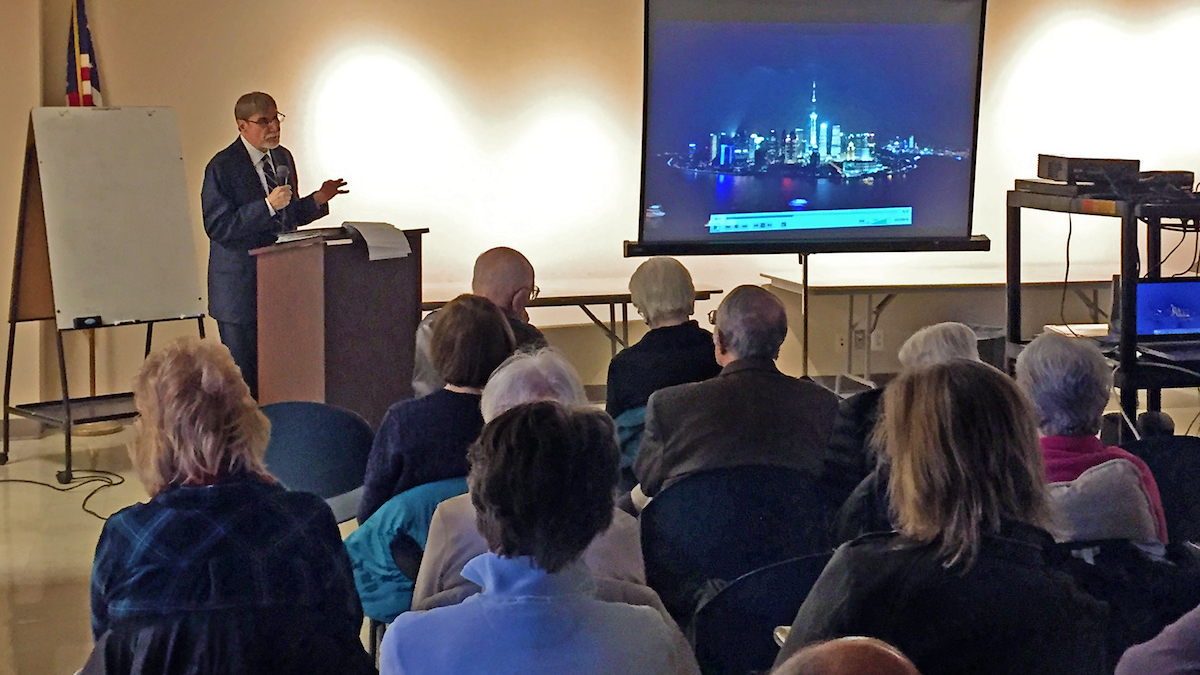
J. Martin Rochester, a Curators’ Distinguished Teaching Professor of political science, speaks to the question of “The Waning of Pax Americana?” during a Great Decisions 2018 lecture last Thursday afternoon at the Ethical Society of St. Louis. (Photo by Steve Walentik)
President Donald Trump’s inaugural address signaled a potential shift in the way the United States operates on the world stage.
He used the speech to trumpet a message of “America First” which seemed at odds with the strategy practiced by the country for more than 70 years – promoting democratic values around the globe while backing it up with military strength.
To what degree American foreign policy will change during his presidency is still being learned less than 14 months after he moved into the White House.
J. Martin Rochester, a Curators’ Distinguished Teaching Professor of political science at the University of Missouri–St. Louis, examined that subject last Thursday when he delivered a lecture on “The Waning of Pax Americana?” as part of the Great Decisions 2018 series at the Ethical Society of St. Louis.
The World Affairs Council of St. Louis presents the series in partnership with International Studies & Programs at UMSL.
Rochester opened his talk by laying out a case that there had been signs of decline in the global world order before Trump’s ascendency.
“There’s general consensus that over the past eight years especially there’s been a decline and, indeed, unraveling of the liberal international order – the so-called Pax Americana – that the United States led the way in creating after World War II, built around international institutions, alliances, free trade, democratic norms,” Rochester told the lunchtime crowd in the Ethical Society’s Becker Room.
He pointed to chaos in the Middle East, the global refugee crisis and the looming threat of weapons of mass destruction in the hands of rogue states such as Iran and North Korea and non-state actors such as ISIS and Al-Qaeda. Other examples included Chinese claims to the South China Sea, Russian claims to Crimea and fractures developing in the European Union.
Rochester also borrowed an analogy from his own book titled “U.S. Foreign Policy in the 21st Century: Gulliver’s Travails.” The book was published in 2007, but the dynamic it describes remains applicable today.
“The logic of the subtitle was that the United States in many ways resembles Gulliver, the fictional character in Jonathan Swift’s satire, ‘Gulliver’s Travels,’” Rochester told the crowd. “He was a normal-sized guy, who was shipwrecked and ends up on an island with these little, 4-inch people called Lilliputians, and suddenly he’s a giant, and you would think he could now dominate the island, but he gets overtaken by them and tied up in knots. In many ways, the United States is Gulliver.”
The United States, since the fall of the Berlin Wall in 1989 and the collapse of the Soviet Union two years later, has been unrivaled as a global player. Rochester noted that the U.S. spends more on its military than the next 12 countries – China, Russia, India, North Korea, Germany, among them – combined. American military spending has increased since Trump became president.
What’s more, the U.S. Gross Domestic Product is approaching $20 trillion, far ahead of that of the next closest country, China.
He noted the high number of the world’s leading universities located in the United States.
“On every dimension of power conceivable, the United States is No. 1, and nobody’s close,” he said. “And yet, like Gulliver, we’ve been tied up in knots in recent years, and in fact, I think one is hard-pressed to find any place on the planet – in Asia, Africa, the Middle East, Latin America, Europe or anywhere else – where we have been succeeding in exercising power and influence.”
Attendees watched part of a video titled “Pax Americana: The Global Liberal Order” produced by the Foreign Policy Association. It highlighted many of the ways that the order increasingly has been under strain or has changed since the turn of the 21st Century.
Rochester did spend time near the end of his lecture trying to explain the challenge of fitting Trump into one of the three contemporary schools of thought about foreign policy: neoconservatism, liberal internationalism or neo-isolationism.
“It’s still not clear where we’re going under Trump,” Rochester said. “He’s sort of a strange brew between neoconservatism and neo-isolationalism.”
He explained himself by pointing to Trump’s embrace of American exceptionalism and flag waving and seeming endorsement of unilateralist and hawkish use of armed force, at least against terrorists. That all fits with the neoconservative approach that dominated American foreign policy during the presidency of George W. Bush.
But Rochester also noted Trump’s desire to focus on problems at home and caution against over-involvement in humanitarian intervention.
“He’s suggested retrenchment in overseas alliances, foreign aid and other commitments, including trade,” Rochester said.
It is unclear how the influence of both schools of thought will be balanced during the remainder of his administration.
Rochester’s talk was the first in the eight-week Great Decisions 2018 series. UMSL faculty members Joel Glassman, Jean-Germain Gros and Repps Hudson will also be speaking in the coming weeks.
Glassman, an associate professor of political science and academic director of International Studies & Programs, will give a lecture March 22 on the topic of “China and America: The New Geopolitical Equation.”
Gros, a professor of political science and public policy, will be speaking April 19 on “South Africa’s Fragile Democracy.”
Hudson, an adjunct faculty member at UMSL, St. Louis Community College and Washington University in St. Louis and a past reporter and columnist at the St. Louis Post-Dispatch, will give a lecture March 29 on “Media and Foreign Policy.”
Each lecture is scheduled from noon to 1:30 p.m. at the Ethical Society of St. Louis.














